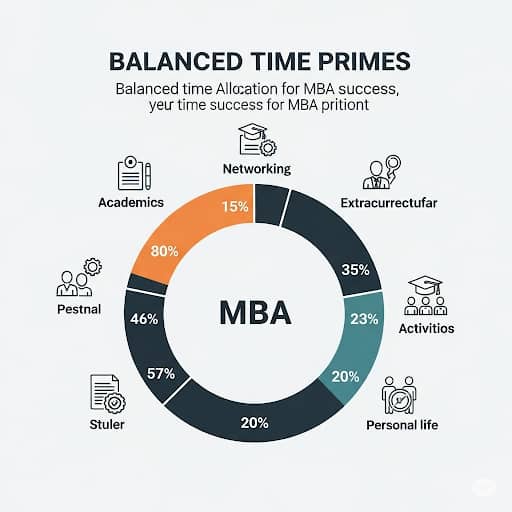MBA programs demand more than just hard work, they require smart study strategies. Find out how to maximize your learning while maintaining balance during this intense academic journey. My first week in business school was daunting, staring at the mountain of case studies, financial models, and group project deadlines while trying to navigate a completely new city. The student next to me in orientation which was a former military officer, leaned over and whispered, “This feels like being dropped behind enemy lines without a map.” He wasn’t wrong. What I eventually learned was that surviving an MBA program isn’t about working harder, but about working differently.
Understanding Your Learning Rhythm
One of the most valuable discoveries came when I tracked my energy levels for two weeks. I realized my peak concentration hit mid-morning, completely tanked after lunch, and resurged in the early evening. This simple awareness let me stop fighting my natural rhythm. Complex financial modeling moved to mornings, lighter reading to post-lunch slumps, and group work to evenings when human interaction kept me engaged. A classmate with opposite patterns scheduled differently, and we both improved our retention dramatically.
The Power of Strategic Immersion
Business school delivers information like a firehose, but the most successful students I’ve observed don’t try to drink it all. They become selective divers. One friend treated each class like a consulting engagement, she’d identify the core frameworks that mattered most to her career goals and drill down on those, while maintaining just enough familiarity with other concepts to participate intelligently. This approach served her better than those who skimmed everything but mastered nothing.
Making Case Studies Work for You
Early on, I wasted hours reading cases cover-to-cover before realizing the professionals we studied didn’t work that way. A visiting executive changed my perspective when he said, “In the real world, you’ll have fifteen minutes to grasp the key issues, not three hours.” Now I teach students to start with the exhibits and discussion questions, then work backward. This forces you to think like a decision-maker rather than a student.
The Forgotten Art of Note-Taking
Modern classrooms full of laptops create an illusion of productivity, but I’ve watched the most engaged students consistently outperform their distracted peers. One section mate handwrote notes in a modified Cornell system, leaving the right margin blank for post-class reflections. This simple practice helped him integrate concepts better than any recording device. Another created visual maps connecting class concepts to her work experience, a technique that later helped her speak fluently about applications during interviews.
Group Study That Actually Works
Study groups often degenerate into social sessions or anxiety-fests, but when structured well, they become force multipliers. The most effective ones I’ve seen operate like mini-consulting teams: assigning pre-work, using strict agendas, and rotating facilitation roles. A friend’s group even created “executive summaries” of key concepts after each session, documents that became invaluable come exam season.
Managing the Mental Load
The hidden curriculum of business school is emotional stamina. I advise students to schedule recovery as rigorously as classes. One classmate swore by his “Sunday Reset”, five hours completely offline, usually hiking. Another practiced “commute learning,” using travel time for podcasts or language apps, preserving evenings for recharging. These small boundaries prevent the constant low-grade panic that undermines real learning.
When to Step Away
Paradoxically, some of my most important breakthroughs came during breaks. There’s neuroscience behind this, our brains solve tough problems during downtime. Now I coach students to recognize when staring at a spreadsheet for another hour is actually counterproductive. The student who struggled with valuation concepts until she explained them to her non-business spouse wasn’t just getting teaching experience, she was forcing her brain to reconceptualize the material.
The Long Game

What separates temporary academic success from lasting professional impact is application. The students who thrive beyond graduation are those who treat every assignment as a prototype for real-world challenges. One alumnus repurposed his marketing project into a startup pitch. Another used her operations research to improve her family’s manufacturing business. When you approach learning as practice rather than performance, the knowledge sticks.
The secret no orientation tells you? An MBA isn’t about memorizing frameworks, it’s about training your mind to navigate complexity with confidence. The students who embrace this shift don’t just survive business school; they emerge transformed.
References
Hartwig, M. K., & Dunlosky, J. (2021). To what extent do study habits relate to performance? CBE-Life Sciences Education, 20(1), ar12.
University of Tennessee at Chattanooga, Gary W. Rollins College of Business. (2022, November 18). 8 tips for building strong and effective study habits while earning your MBA.
Pioneer Education. (2025). A guide to building effective study habits.
Khosravi, A., & Khosravi, S. (2019). Relationship between study habits and academic achievement in students of medical sciences in Kermanshah-Iran. PMC, 7(8).

